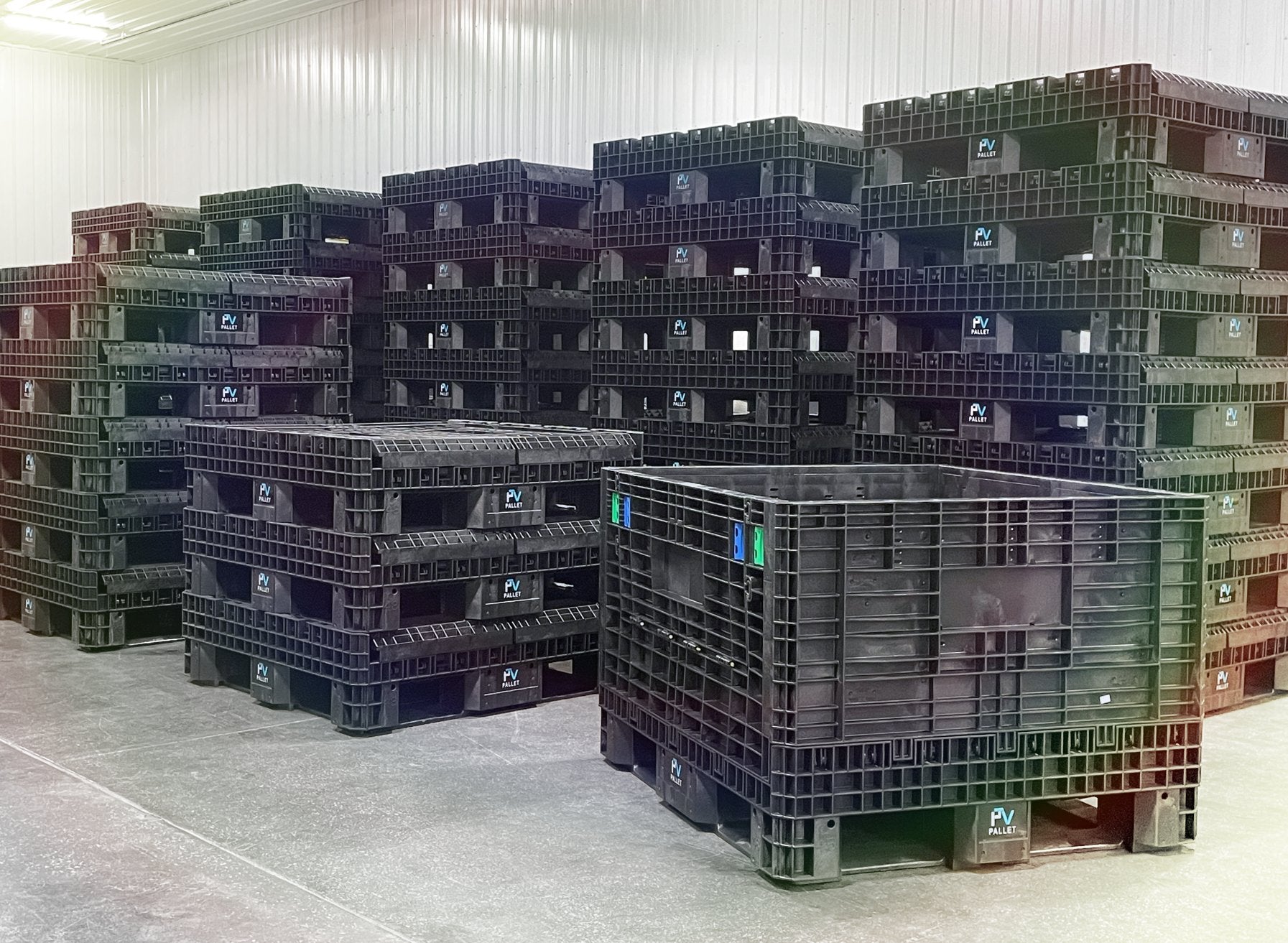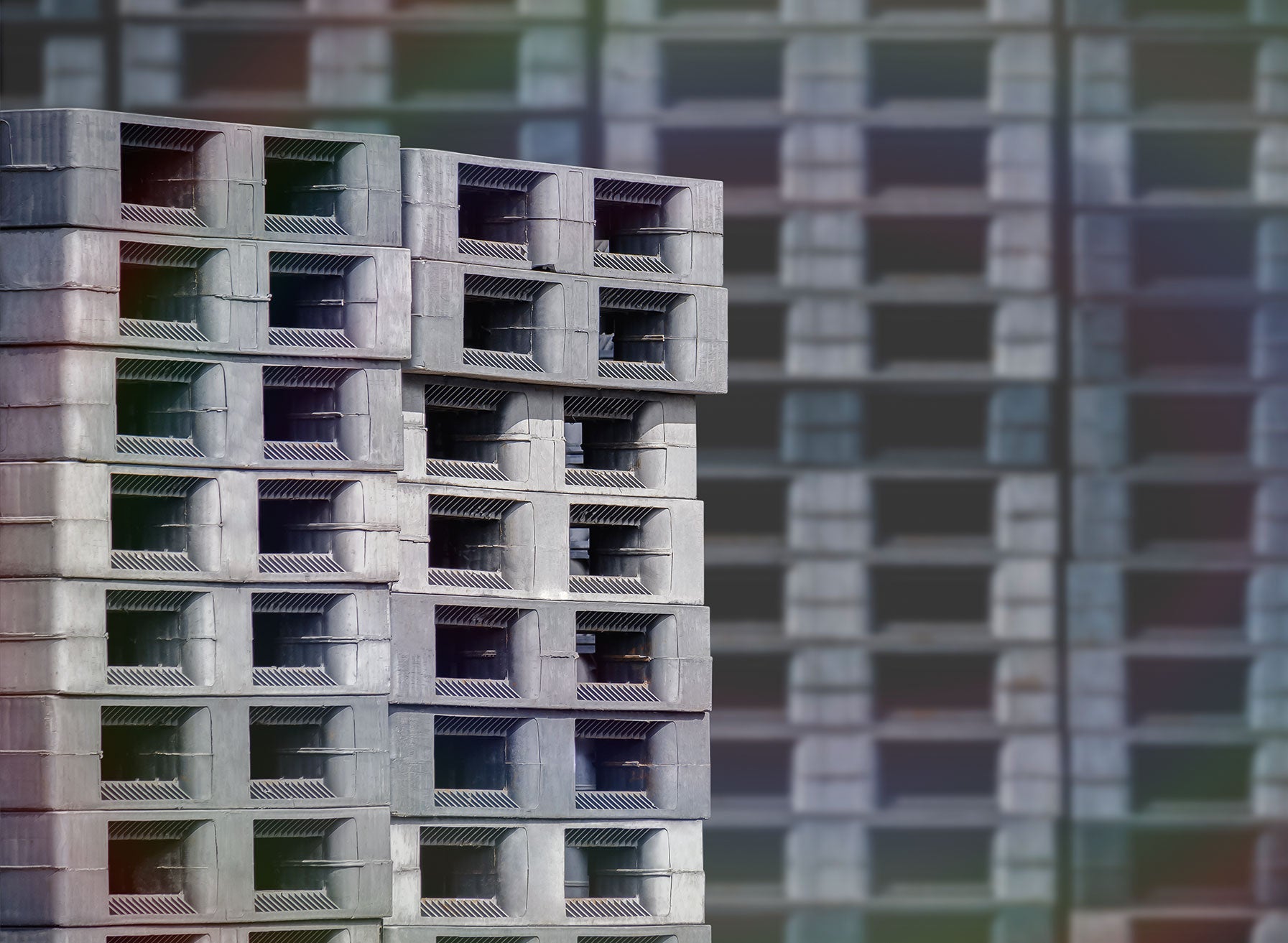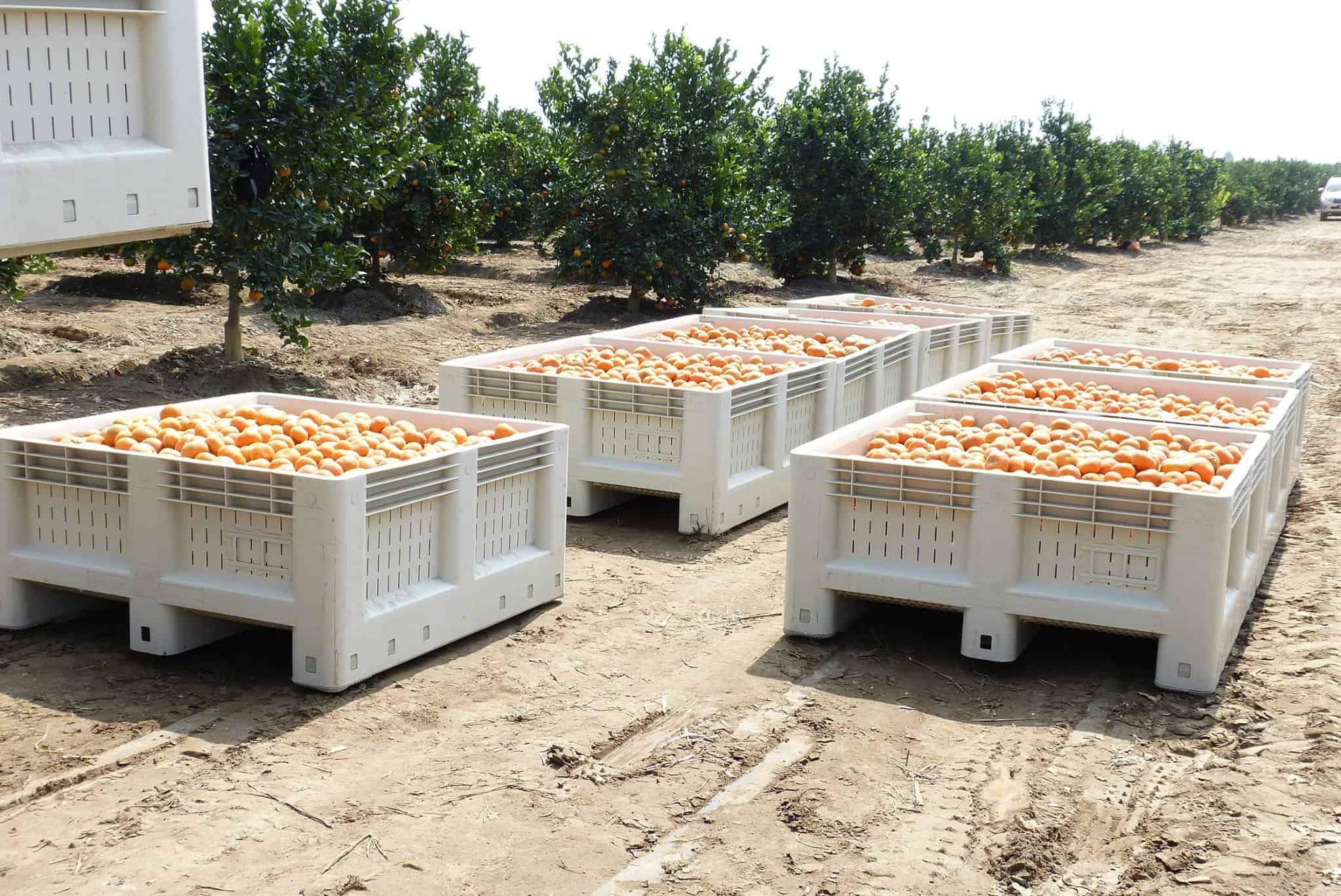How to Choose the Right Plastic Pallet or Bulk Bin for Your Business
If you’re in the market for plastic pallets or bulk bin containers, you already know the advantages of reusable packaging like durability, reusability, and long-term cost savings. But with all the options out there, how do you choose the right one for your specific needs? This guide will help you navigate key factors so you can make the best decision for your business.
Consider Your Industry Requirements
Different industries have specific regulations and requirements when it comes to pallets and bulk containers. For example:
- Food & Beverage: Look plastic pallets and bins made from FDA-approved plastics that are easy to clean and resistant to contaminants. Many food processors prefer plastic over wood due to its resistance to bacteria, mold, and pests, ensuring compliance with food safety regulations.
- Agriculture: Choose plastic bulk bins and pallets that can handle exposure to moisture, dirt, and varying weather conditions. Ventilated designs are often preferred for produce storage, while heavy-duty plastic bins are ideal for grain, feed, and equipment storage. In farming operations, reusable harvest bins reduce reliance on disposable wooden crates, offering a cleaner and more sustainable solution.
- Solar: Consider how long plastic pallets and bulk bins will be exposed to outdoor conditions. Choose UV-resistant and weatherproof plastic pallets and bulk containers that can withstand prolonged exposure to sunlight, rain, and temperature fluctuations. Solar companies need solutions that protect fragile solar modules and components while optimizing storage space. Plastic pallets and bulk bins also provide a sustainable and reusable alternative to traditional packaging, helping solar companies reduce their environmental footprint.
- Pharmaceuticals: Select pallets with smooth, non-porous surfaces that prevent bacteria growth. Many pharmaceutical companies require highly sanitary and chemically resistant options for safe transportation, ensuring product integrity and contamination prevention.
- Retail & Distribution: Nestable or stackable plastic pallets help optimize storage and transport efficiency. Many retailers prefer lightweight yet durable options that can be reused multiple times in distribution cycles, reducing waste and transportation costs.
- Automotive & Manufacturing: Heavy-duty plastic bulk bins and pallets designed for high weight capacity and secure stacking are ideal. These industries rely on durable plastic bins for safe and efficient transport of heavy components, raw materials, and engine parts.
Choose the Right Size and Design
Choosing the right plastic pallet or bulk bin for your application helps improve storage, transportation, and efficiency in your supply chain. The right size and design can reduce costs, protect products, and make handling easier. Here’s how to find the best option for your needs:
Find the Standard
Before purchasing, consider the standard sizes commonly used in your industry for both plastic pallets and bulk containers. Choosing the right dimensions ensures smooth integration with warehouse racking systems, transportation equipment, and automated material handling processes.
- Match industry standards: Common pallet and bulk container foot print sizes include 40” x 48”, 45” x 48”, though different industries may have specific requirements. Choosing the right size helps maximize warehouse space and truckload efficiency.
- Optimize load efficiency: Compare the number of boxes or crates you currently fit in a truckload to the capacity of a bulk container. Switching to bulk bins can often reduce wasted space and improve shipping efficiency by holding more product per load.
- Choose space-saving options: Nestable plastic pallets reduce return freight costs by stacking inside one another. Collapsible bulk containers fold down when empty, minimizing storage space.
- Consider rackable vs. stackable designs: Rackable plastic pallets provide stability when stored in racking systems, while stackable pallets and bulk container options are ideal for maximizing floor storage space.
Consider the Product
The type of products you handle plays a major role in choosing the right bulk bin or pallet design.
- Ensure proper weight capacity: Choose pallets or bins that can support the weight of your products. Heavy-duty plastic pallets prevent warping and cracking under heavy loads.
- Choose the right material: Most plastic pallets and bulk bins are made from high-density polyethylene (HDPE) or polypropylene (PP), which offer durability, chemical resistance, and easy cleaning for hygienic applications.
- Select vented, solid-wall, or collapsible bulk bins: Vented bulk bins are best for perishable goods like produce, allowing for airflow and reducing spoilage. Solid-wall bins are better for liquids, powders, or fragile items that require extra protection. Collapsible bins offer flexibility by providing sturdy storage when in use and compact storage when empty, making them a great choice for businesses looking to save space during return shipments.
Start with a Sample
To avoid costly mistakes, many companies begin with a trial phase before making a large investment.
- Test multiple options: Order samples of different sizes and styles to see how well they perform in real-world conditions.
- Assess durability and performance: Conduct load tests, stacking trials, and compatibility checks with your handling equipment before committing to a bulk purchase.
- Gather team feedback: Involve warehouse and logistics staff in the testing process to ensure the selected pallets and bins are practical and easy to work with.
By carefully selecting the right size and design for your plastic pallets and bulk bins, you can streamline operations, enhance efficiency, and reduce long-term costs. Whether you need standard sizes, nestable options, or specialized bulk bins, taking the time to evaluate your needs will lead to a smarter, more effective investment.

Assess Environmental and Sustainability Goals
Sustainability is becoming a top priority for many businesses. Reusable plastic pallets and bulk bins are replacing wood pallets and single-use alternatives because they offer a more durable and eco-friendly solution. Some of the key benefits include:
- Recycled Materials & Circular Economy: Many plastic pallets and bulk bins are made from recycled materials, helping to reduce waste and promote a circular economy by keeping materials in use longer and out of landfills.
- Lower Environmental Impact: A comprehensive life cycle assessment (LCA) comparing wood and plastic pallets in solar panel packaging has shown that reusable plastic pallets significantly reduce carbon emissions over their lifespan. While wood pallets may have a lower upfront carbon footprint, their short lifespan and high disposal rate make them less sustainable in the long run.
- Durability & Reusability: Unlike wood pallets, which often break and require frequent replacement, plastic pallets and bulk bin containers are designed for multiple reuse cycles. This longevity not only reduces waste but also lowers costs over time.
- Safety & Product Protection: Plastic pallets and bulk bins are more consistent in quality and structure compared to wood pallets and cardboard boxes, reducing the risk of damage to products. They also eliminate concerns related to splinters, nails, and moisture absorption, which can compromise packaging integrity and worker safety.
As businesses continue to prioritize sustainability, reusable packaging solutions will play a crucial role in reducing waste, lowering costs, and improving overall supply chain efficiency. Companies that embrace circular solutions now will be better positioned to meet environmental regulations and customer expectations in the future.
Factor in Handling and Storage Efficiency
Efficient handling and storage of plastic pallets and bulk bins can significantly impact your overall logistics costs and operational productivity. Choosing the right pallets and bins involves considering how they interact with your warehouse equipment, storage systems, and transportation methods. Here are key factors to keep in mind:
- Compatibility with Equipment: Ensure that the pallets and bins you choose work seamlessly with your existing material-handling equipment, including forklifts, pallet jacks, and automated conveyor systems. Properly designed pallets can prevent jams and improve workflow efficiency in automated environments.
- Stackability, Space Optimization, and Reverse Logistics: Stackable and collapsible plastic bulk bins help maximize warehouse space by reducing the footprint of empty containers when not in use. This is especially beneficial for businesses with seasonal inventory fluctuations, as collapsed bins free up valuable space when storage demand is lower. Additionally, collapsible bulk containers play a crucial role in reverse logistics by making return shipments more cost-effective. When empty, these bins can be folded down to take up significantly less space during return transport, reducing freight costs and improving supply chain efficiency.
- Durability for Long-Term Use: High-quality plastic pallets and bulk contaienrs are built to withstand multiple reuse cycles without warping, cracking, or breaking. This longevity reduces the need for frequent replacements, ultimately lowering total costs and improving return on investment (ROI). Some models are resistant to moisture, chemicals, and extreme temperatures, making them ideal for industries with demanding storage conditions.
- Ease of Cleaning and Maintenance: Unlike wood pallets, plastic pallets and bins are resistant to contaminants such as mold and pests, making them easier to clean and maintain. This is especially crucial for industries like food processing and pharmaceuticals, where hygiene and regulatory compliance are top priorities.
By factoring in handling and storage efficiency, businesses can improve operational flow, reduce labor costs, and extend the lifespan of their packaging solutions. Incorporating collapsible bulk bins into reverse logistics strategies can further enhance cost savings and sustainability, making plastic pallets and bulk containers a smart investment for long-term logistics success.
Explore Custom Packaging Solutions
When it comes to industrial packaging, one-size-fits-all solutions don’t always meet operational needs. Standard plastic pallets and bulk containers work well for many businesses, but industries with unique shipping and storage requirements often need custom plastic pallets, custom bulk bins, and specialized dunnage to optimize efficiency, protect products, and reduce waste.
Custom plastic pallets and bulk bins are designed to address industry-specific challenges, ensuring better performance, durability, and protection for sensitive or high-value products. Some key advantages include:
- Optimized Size & Load Capacity: Custom dimensions prevent wasted space, improve stacking efficiency, and support unique load requirements.
- Enhanced Durability & Product Protection: Reinforced walls, impact-resistant materials, and secure lids help prevent damage during transit.
- Industry-Specific Features: Whether you need drainage holes for food safety, anti-slip surfaces for stability, or collapsible designs for storage, custom options provide the perfect fit.
- Custom Dunnage for Added Protection: Foam inserts, dividers, molded plastic trays, and separators help secure fragile, high-value, or oddly shaped products during transport and storage. This is especially crucial for industries like solar energy, automotive manufacturing, and aerospace, where component protection is critical.
- Sustainability & Reusability: Designed for long-term use, custom plastic pallets and bins help businesses reduce packaging waste and lower costs over time.
Businesses in solar energy, automotive, food processing, and industrial manufacturing require packaging that supports efficiency, safety, and sustainability goals. PVpallet Custom Packaging Solutions offers fully customizable plastic pallets, bulk bins, and dunnage solutions to optimize your logistics and supply chain.

Invest in the Right Packaging for Long-Term Success
Choosing the right plastic pallets and bulk bins for your organization is more than just a logistics decision—it’s an investment in efficiency, sustainability, and cost savings for your business. By considering industry requirements, product protection, handling efficiency, and custom solutions, you can optimize your supply chain while reducing waste and operational costs.
At PalletsandBins.com, we offer a wide range of durable, reusable, and customizable packaging solutions to meet your needs. Whether you're looking for standard plastic pallets, collapsible bulk bins, or industry-specific designs, we have the right solution to support your business growth.
For a deeper dive into selecting the right packaging, check out our Ultimate Guide to Plastic Pallets and Bulk Containers.
Explore our selection today and take the next step toward a smarter, more sustainable packaging strategy. Don't see what you need? Contact us and we will help you find it.








